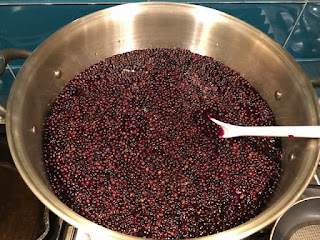This week the results came in for the
Kansas City Cellarmasters Wine 2018 Classic. I entered 9 wines this year - only $10 entry fee, and I really wanted some feedback on all of of my 2016 wines. Also, some folks say these wine competitions are a bit random, so more entries gives a better shot at a medal.
In the past I've medaled at about a 50% rate. I guess I'm getting better, because this year I medaled with 7 of the 9 entries. I won second in class in two categories, worth $40 in gift certificates at
St. Louis Wine and Beermaking. Hopefully I can put that toward grapes! In no particular order...
Syrah/Elderberry blend, a 50/50 blend, not surprisingly scored just out of medal range at 12.67. Judges felt that the elderberry overpowers this wine and I completely agree. You have to close your eyes and pretend you are drinking a fruity elderberry.
Syrah/elder/blackberry, 70/15/15 blend, scored better at 13.83 for a bronze. Still probably too much elderberry, and some judges felt it could use some sugar. This need for more residual sugar shows up a lot in my feedback, and I'm beginning to think this is just a personal preference we have for drier wines. These dry wines suffer in competition due to the
Pepsi Paradox. I've put at least one bottle away for long term aging, I think this wine will age well.
The
2016 passion fruit wine was interesting because we opened a bottle at Christmas (fulfilling a vow to open one bottle of each wine just before the submission date, just for quality control purposes). I thought it was excellent. Beth and Lisa noted an off odor of funk or onions which, try as I might, I couldn't pick up. Well the judges missed it too, and this wine came in at 15.33, my highest score, worth a silver medal.
Blueberry rosé scored just in medal range at 13.00, but that score was worth second in the category, so was enough for one of the $20 gift certificates. I'm not particularly proud of this wine - I bottled it early, but missed on the acid. So I dumped it back into the carboy, treated it with KHCO3, then rebottled. It was better, but I thought the KHCO3 left it a little out of balance. The judges thought it was still too acidic with too little blueberry. Fair enough. I recognized the mistakes I made and adjusted with the 2017 version of this wine.
The wine with perhaps the greatest discrepancy between comments and score was the
2016 elderberry. I got three judging sheets back, and the final comments from each were, "Nice balanced fruity wine," "Nice overall wine for its age," and "Very nice wine." So I would have expected a little better than 13.67, bronze medal range. Elderberry tends to age well. I am going to start holding some of these wines for year or two before sending them in.
Chambourcin scored 14.3, worth a bronze. There weren't too many negative comments here either, with one judge noting this wine should age well. I agree. Thank you, Bill Books, for these grapes.
I think the judges at this competition just don't like dry blackberry wine. Seems there is an expectation that blackberry will always be sweet. I went to great lengths to assure that my
2016 blackberry did not suffer from the fatal flaws of the 2015 blackberry. I still only managed a score of 11.67. Comments included "too tart" and "needs some sugar." One judge noted "little blackberry aroma." There is literally nothing but blackberry in this wine. Short of spiking it with flavoring or blackberry brandy, there is no way to cram in more blackberry. Next year I may pull off a 1/2 gallon and sweeten it to 2% RS, just for this competition.
In contrast, everyone lines up behind the
2016 blueberry. This wine scored a silver medal with 15.17. We did bench trials for back-sweetening and wound up using 40g/gal. Comments included another "too tart" along with "needs more blueberry." I made some
tweaks to my blueberry this year that might help in this regard.
Finally, the
2016 pinot grigio. This was a California juice bucket. This wine scored 15.17 as well, worth a silver medal and second in the white vinifera category. I've detected intermittently a very slight off odor - one of the four judges picked this up as well. They all liked it well enough however.






